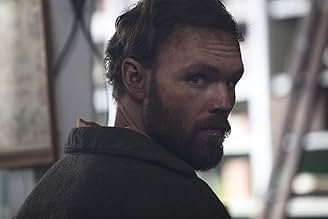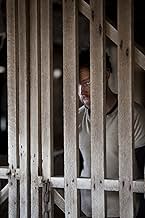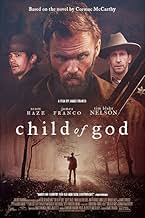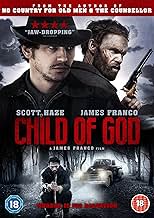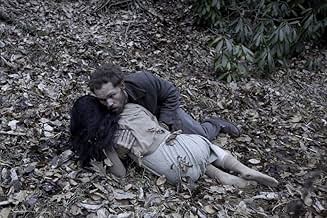IMDb RATING
5.4/10
4.6K
YOUR RATING
A dispossessed, violent man's disastrous attempt to exist outside the social order.A dispossessed, violent man's disastrous attempt to exist outside the social order.A dispossessed, violent man's disastrous attempt to exist outside the social order.
- Director
- Writers
- Stars
- Awards
- 2 wins & 1 nomination total
Ciera Danielle
- Salesgirl
- (as Cierra Parrack)
- Director
- Writers
- All cast & crew
- Production, box office & more at IMDbPro
Featured reviews
This film is about a woodsman who is violent and lonesome. He is a disturbed individuals disowned and disliked by the village.
The main character is a man who is wildly different from the other villagers. He cannot relate to other people, and lives in a world of his own. Despite him being a child of God, his behavior becomes increasingly erratic and violent. He's not a character to like, and not just because of his horrid behavior but also of his appearance. I guess "Child of God" is a good film because it evokes a reaction in the mind of viewers, and provoke thoughts on how a person can descend to such lowly depths. It's not a film to like, but to admire for its artistic achievements.
The main character is a man who is wildly different from the other villagers. He cannot relate to other people, and lives in a world of his own. Despite him being a child of God, his behavior becomes increasingly erratic and violent. He's not a character to like, and not just because of his horrid behavior but also of his appearance. I guess "Child of God" is a good film because it evokes a reaction in the mind of viewers, and provoke thoughts on how a person can descend to such lowly depths. It's not a film to like, but to admire for its artistic achievements.
When word broke out that James Franco, wannabe wunderkind who has taken to adapting classic American literature to the big screen to, well, mixed results, would be adapting my favorite author's work, I prickled with righteous indignation. I don't care much for Franco and indeed find him to be a jack of all trades but indeed master of none: he is a subpar actor, his writing leaves a LOT to be desired, and his direction feels a little too over-reliant on flashy tics that add an unnecessary layer of pretension to the proceedings. And here he is, adapting the work of the master: Cormac McCarthy.
At first, Franco announced he would be tackling McCarthy's masterpiece, the ultraviolent scalp- hunter saga "Blood Meridian", but after a while, he decided to cut his teeth on a smaller -- but by no means lesser -- work of ol' Cormac's. And this is how he came to deliver "Child of God" onto the masses.
Despite its brevity, "Child of God" is by no means an accessible novel: it's lean, mean and has a soul blacker than night. The novel is just like its protagonist, Lester Ballard, a loner who skulks about the Tennessee backwoods like a dog suffering the early onset of rabies, indulging in varying degrees of vicious activities, from assault to necrophilia to, eventually, murder. Ballard is not your typical protagonist, and yet the way Cormac McCarthy approached him, he was made both revolting and at the same time strangely empathetic, as he managed to submerge the reader into Ballard's festering brain. "A child of God much like yourself" is how McCarthy's opening lines describe Ballard, signifying that the madness and malice that ferments within the man is a seed to be found in any of us. And despite its grim premise, "Child of God" is astoundingly, gut-bustingly funny, like the worst sort of dead-baby joke.
Unfortunately, I feel that Franco has missed the levity, instead emphasizing the straight serial- killer premise. This isn't to say that Franco doesn't hew close to the novel; if anything, he is a little too faithful, even relying on having blocks of text from the novel playing out on the screen. It's an admirable slice of avant-garde, even if I feel that Franco is forgetting the first rule of filmmaking: show, don't tell. Even though McCarthy's prose is magic, Franco should've known (as the Coen Brothers and John Hillcoat knew before him) that McCarthy's words can be translated visually to bring the same harrowing, to-the-bone effect.
That said, Franco does show a great deal of passion for the material. But even beyond the use of McCarthy's words, the most crucial aspect of an adaptation of "Child of God" is the man who will be playing Lester Ballard. And in this film, Ballard is played not by Franco, but by his buddy and frequent collaborator Scott Haze. Whether or not you approve of Haze's performance, you can't say he doesn't go for broke in his portrayal of Ballard. Haze's Ballard is beyond laconic; he speaks in strangled, guttural inarticulations that sound almost caveman-like. I do think that there are times that he lays it on a bit too thick, and I think his drooling, leering presence lacks any of the bizarre charm that made Ballard such a fascinatingly funny character in the book. Haze plays Ballard like a "Deliverance" refugee, and while it isn't bad work on its own, I do feel that Haze is a bit too superficial in his take on one of McCarthy's greatest creations. He makes up for it in intensity, though, gotta give him that.
It also doesn't help that Franco's film has a cheap aesthetic to it, lacking any of the grim Gothic atmosphere of the book. It's my biggest issue with Franco as a director: he has no real concept of effective mise-en-scene, instead opting to point the camera and let things play, cutting an odd times that feel far too arrhythmic to be deliberate. Much like last year's interesting-but- too-shallow "As I Lay Dying", Franco gets the story right but tells it in the most simple, A-to-B- to-C way possible. It's worth the watch for Haze's performance (and also for Tim Blake Nelson, who feels like he should've featured in any and every Cormac McCarthy film before this), but it only serves to prove that we're lucky that we dodged a "Blood Meridian" adaptation by James Franco.
At first, Franco announced he would be tackling McCarthy's masterpiece, the ultraviolent scalp- hunter saga "Blood Meridian", but after a while, he decided to cut his teeth on a smaller -- but by no means lesser -- work of ol' Cormac's. And this is how he came to deliver "Child of God" onto the masses.
Despite its brevity, "Child of God" is by no means an accessible novel: it's lean, mean and has a soul blacker than night. The novel is just like its protagonist, Lester Ballard, a loner who skulks about the Tennessee backwoods like a dog suffering the early onset of rabies, indulging in varying degrees of vicious activities, from assault to necrophilia to, eventually, murder. Ballard is not your typical protagonist, and yet the way Cormac McCarthy approached him, he was made both revolting and at the same time strangely empathetic, as he managed to submerge the reader into Ballard's festering brain. "A child of God much like yourself" is how McCarthy's opening lines describe Ballard, signifying that the madness and malice that ferments within the man is a seed to be found in any of us. And despite its grim premise, "Child of God" is astoundingly, gut-bustingly funny, like the worst sort of dead-baby joke.
Unfortunately, I feel that Franco has missed the levity, instead emphasizing the straight serial- killer premise. This isn't to say that Franco doesn't hew close to the novel; if anything, he is a little too faithful, even relying on having blocks of text from the novel playing out on the screen. It's an admirable slice of avant-garde, even if I feel that Franco is forgetting the first rule of filmmaking: show, don't tell. Even though McCarthy's prose is magic, Franco should've known (as the Coen Brothers and John Hillcoat knew before him) that McCarthy's words can be translated visually to bring the same harrowing, to-the-bone effect.
That said, Franco does show a great deal of passion for the material. But even beyond the use of McCarthy's words, the most crucial aspect of an adaptation of "Child of God" is the man who will be playing Lester Ballard. And in this film, Ballard is played not by Franco, but by his buddy and frequent collaborator Scott Haze. Whether or not you approve of Haze's performance, you can't say he doesn't go for broke in his portrayal of Ballard. Haze's Ballard is beyond laconic; he speaks in strangled, guttural inarticulations that sound almost caveman-like. I do think that there are times that he lays it on a bit too thick, and I think his drooling, leering presence lacks any of the bizarre charm that made Ballard such a fascinatingly funny character in the book. Haze plays Ballard like a "Deliverance" refugee, and while it isn't bad work on its own, I do feel that Haze is a bit too superficial in his take on one of McCarthy's greatest creations. He makes up for it in intensity, though, gotta give him that.
It also doesn't help that Franco's film has a cheap aesthetic to it, lacking any of the grim Gothic atmosphere of the book. It's my biggest issue with Franco as a director: he has no real concept of effective mise-en-scene, instead opting to point the camera and let things play, cutting an odd times that feel far too arrhythmic to be deliberate. Much like last year's interesting-but- too-shallow "As I Lay Dying", Franco gets the story right but tells it in the most simple, A-to-B- to-C way possible. It's worth the watch for Haze's performance (and also for Tim Blake Nelson, who feels like he should've featured in any and every Cormac McCarthy film before this), but it only serves to prove that we're lucky that we dodged a "Blood Meridian" adaptation by James Franco.
Scott Haze's performance as Lester Ballad is remarkable, but this film is simply depressing--unless that is, your idea of entertainment is spending 100 minutes watching a man of limited intelligence spiral into insanity after his farm is sold out from under him.
I thought my neighbour was a slightly mad, uncouth and antisocial individual, and he sounds a lot like Ballard, so maybe he's a distant relative.
I thought my neighbour was a slightly mad, uncouth and antisocial individual, and he sounds a lot like Ballard, so maybe he's a distant relative.
I sat still after the United States premiere of James Franco's "Child of God" at the New York Film Festival, not as much contemplating whether or not it was good as I was considering whether or not I liked it. Mostly true to the Cormac McCarthy novel on which it was based, the film follows the cloistered and violent existence of Lester Ballard (Scott Haze) who lives isolated in the woods of Tennessee committing crimes of the most grotesque caliber. I won't say much more about the plot other than the fact that the sadistic actions shown on screen evoke an uneasy humor, a disturbing essence of comical brutality. To say the least, this movie is not for the queasy or the fainthearted. You will squirm.
Organization:
James Franco decided to organize the film into three acts, clearly distinguished from one another by title cards. While the producer argued this was done to manifest the passage of time, I felt it had no such effect. To add to this distortion of time and space, scenes are executed as vignettes. There's a constant transition fading in and out of the action, not only prompting confusion as to how much time passes between each scene, but also distracting the audience from the plot by means of excessive filmmaking. Some scenes exist solely for the purpose of character development while others seem to have no function at all. The relevant vignettes are strung together by a consistently distressed brain. While this structure may detract from the linear storyline, it instead leaves more up to interpretation and imagination. No number of scenes can embody the true insanity of Lester Ballard, we can only imagine what madness must be going on between the fades.
Performances:
Scott Haze's performance as Lester Ballard is probably the most memorable and noteworthy aspect of the film. Haze, who lived alone in caves and lost 45 pounds to prepare for this dynamic and challenging role, brilliantly expresses the complex lunacy of Ballard. He adjusted his voice to a barely comprehensible Tennessee accent and habitually licks his lips and bares his teeth, similar to Heath Ledger's Joker. Admitting that he channeled troubles from his own past when confronting the character, Haze often appears ignorant and childlike, constantly screaming and salivating, a repulsive portrait of a man bore from nature's womb. While sometimes funny, his interactions with his victims are unsettling yet strangely amorous. Just like in the writing of Cormac McCarthy, the audience lacks any sympathy for Ballard, for it's nearly impossible to relate to him. Franco isn't looking for your sympathy, he wants nothing more than your intrigue and attention. To witness Haze is to observe an animal, wild, vicious, and savage. The only other notable performance is that of Tim Blake Nelson playing Sheriff Fate. He conducted the role with a mediated honesty, constructing as realistic a character as possible and standing out within the frame, even with minimal screen time.
Technicalities:
All things considered, the technical aspects of the film are quite impressive. Funded out of James Franco's own pocket, the movie looks and sounds great considering its modest budget. The cinematography of the rural Tennessee landscape is eerily beautiful, shot hand-held on a handful of Canon 5Ds. The desaturated and gritty colors add an appropriate rustic feel to the film, further enhancing the forest terrain. The original music, although not particularly memorable, suits the setting well. Furthermore, the nameless narration was true to McCarthy's technique and certainly added to the tone of the film, keeping the audience attentive all the same. Overall, the movie's unsensational filmmaking is entirely fitting, ensuring the horrors on screen are ever more explicit, ever more real.
Conclusion:
You can tame the land, but you can't tame a man. "Child of God" is a commentary about the dispossessed in an incestuous homeland. Littered with existential imagery and dialogue, the film offers a respectful and honest rendering of the novel. While I may not agree with some storytelling elements and approaches, Franco still manages to get the point across and deliver a message, a testament to rejection, violence, and humanity. The film is definitely worth a watch if you can stomach it and works as a cogent visual supplement to the novel. I look forward to seeing more James Franco adaptations in the future.
Organization:
James Franco decided to organize the film into three acts, clearly distinguished from one another by title cards. While the producer argued this was done to manifest the passage of time, I felt it had no such effect. To add to this distortion of time and space, scenes are executed as vignettes. There's a constant transition fading in and out of the action, not only prompting confusion as to how much time passes between each scene, but also distracting the audience from the plot by means of excessive filmmaking. Some scenes exist solely for the purpose of character development while others seem to have no function at all. The relevant vignettes are strung together by a consistently distressed brain. While this structure may detract from the linear storyline, it instead leaves more up to interpretation and imagination. No number of scenes can embody the true insanity of Lester Ballard, we can only imagine what madness must be going on between the fades.
Performances:
Scott Haze's performance as Lester Ballard is probably the most memorable and noteworthy aspect of the film. Haze, who lived alone in caves and lost 45 pounds to prepare for this dynamic and challenging role, brilliantly expresses the complex lunacy of Ballard. He adjusted his voice to a barely comprehensible Tennessee accent and habitually licks his lips and bares his teeth, similar to Heath Ledger's Joker. Admitting that he channeled troubles from his own past when confronting the character, Haze often appears ignorant and childlike, constantly screaming and salivating, a repulsive portrait of a man bore from nature's womb. While sometimes funny, his interactions with his victims are unsettling yet strangely amorous. Just like in the writing of Cormac McCarthy, the audience lacks any sympathy for Ballard, for it's nearly impossible to relate to him. Franco isn't looking for your sympathy, he wants nothing more than your intrigue and attention. To witness Haze is to observe an animal, wild, vicious, and savage. The only other notable performance is that of Tim Blake Nelson playing Sheriff Fate. He conducted the role with a mediated honesty, constructing as realistic a character as possible and standing out within the frame, even with minimal screen time.
Technicalities:
All things considered, the technical aspects of the film are quite impressive. Funded out of James Franco's own pocket, the movie looks and sounds great considering its modest budget. The cinematography of the rural Tennessee landscape is eerily beautiful, shot hand-held on a handful of Canon 5Ds. The desaturated and gritty colors add an appropriate rustic feel to the film, further enhancing the forest terrain. The original music, although not particularly memorable, suits the setting well. Furthermore, the nameless narration was true to McCarthy's technique and certainly added to the tone of the film, keeping the audience attentive all the same. Overall, the movie's unsensational filmmaking is entirely fitting, ensuring the horrors on screen are ever more explicit, ever more real.
Conclusion:
You can tame the land, but you can't tame a man. "Child of God" is a commentary about the dispossessed in an incestuous homeland. Littered with existential imagery and dialogue, the film offers a respectful and honest rendering of the novel. While I may not agree with some storytelling elements and approaches, Franco still manages to get the point across and deliver a message, a testament to rejection, violence, and humanity. The film is definitely worth a watch if you can stomach it and works as a cogent visual supplement to the novel. I look forward to seeing more James Franco adaptations in the future.
Lester Ballard (Scott Haze) is a disturbed man living in the rural mountains of Tennessee in the 60s. His father killed himself and his mother ran away. His father's property is auctioned off and he becomes a recluse. He gets in trouble with Sheriff Fate (Tim Blake Nelson) after he struggled with a drunken woman. He steals and is a general nuisance. He runs across a young couple dead in their car. He has sex with the dead girl and steals her body away.
I think this is the only movie where a character is actually taking a dump. I've got to say that it's disturbing and gross. It sets the tone for the whole movie. Scott Haze is terrific in his performance. The main problem is that the movie is uninvolving. After awhile, Lester's insanity feels repetitive and lifeless. His isolation infiltrates into the movie. This movie needs more time for Sheriff Fate. I also wonder why the sheriff can't put him away longer and how bad the dead body smells. These are the little things that nag at me when the movie stops being compelling. James Franco's directions are workable but they need to energize the plot more.
I think this is the only movie where a character is actually taking a dump. I've got to say that it's disturbing and gross. It sets the tone for the whole movie. Scott Haze is terrific in his performance. The main problem is that the movie is uninvolving. After awhile, Lester's insanity feels repetitive and lifeless. His isolation infiltrates into the movie. This movie needs more time for Sheriff Fate. I also wonder why the sheriff can't put him away longer and how bad the dead body smells. These are the little things that nag at me when the movie stops being compelling. James Franco's directions are workable but they need to energize the plot more.
Did you know
- TriviaScott Haze moved to Sevierville, TN, to prepare for the role of Lester Ballard. He lived in an isolated cabin in the woods, lost 50 pounds and was reportedly sleeping in caves some nights.
- GoofsLester seems to have an endless supply of bullets.
- Quotes
[repeated line]
Lester Ballard: Get off my fuckin property!
- ConnectionsFeatured in Filmselskabet: Episode #4.1 (2013)
- How long is Child of God?Powered by Alexa
Details
Box office
- Gross US & Canada
- $39,324
- Opening weekend US & Canada
- $27,630
- Aug 3, 2014
- Gross worldwide
- $39,324
- Runtime
- 1h 44m(104 min)
- Color
- Sound mix
- Aspect ratio
- 1.85 : 1
Contribute to this page
Suggest an edit or add missing content




